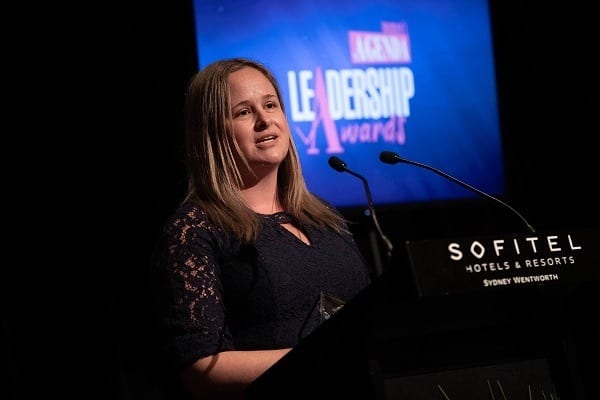She’s now the Surveyor-General of NSW, a role that saw her pick up a Women’s Agenda Leadership Awards gong in September. She’s the first woman to hold the position and the youngest ever person in the role in the office’s 200 year history.
Her goal of landing her current position came up when her husband planted the idea of her being the first woman in the role.
“Many great Aussie stories involve a pub, and mine is no exception. The first time I actually considered the Surveyor General position as a career goal was after going to the Surveyor General Inn at Berrima for lunch with my husband Chris in 2015,” she explains
“While looking at the photos of the Surveyor’s General on the walls of the inn, Chris said to me ‘Wouldn’t it be cool if you were the first female to have her photo on this wall?'”.
“It was at that moment I decided that was where I wanted my career to head. I just didn’t think the opportunity would present itself quite so soon. I have to admit that hanging my photo on the wall of the pub is one of the best moments in my life so far.”
As a trailblazer for women in surveying, Underwood’s an active advocate for improving diversity and inclusivity of her industry.
When asked about the key issues facing women, she said there are simply not enough of them.
“In NSW there are only 32 registered surveyors who are female, which represents only 3 per cent of the profession,” she said.
“The stats for the broader surveying and spatial industry aren’t quite as dire but they’re not too much better at around maybe 25 per cent. We’re actively working to change this – earlier this year as part of international women’s week we held a women in surveying day in Hyde Park in Sydney – attracting 50 girls from high schools across the state. We also released a diversity and inclusion action plan.
She also shared some interesting insights regarding the growing normalisation of women’s participation in STEM subjects.
“Girls tend to be more drawn to humanitarian aspects of a career; pure maths does not lend itself to that aspect naturally, since maths is seen as something ‘removed’ from the world. I think girls have more interest in social consciousness.”
“We need to teach them there’s a practical and humanitarian application to maths and science. It needs to be shown and demonstrated.
“We need to encourage leadership at every level, valuing diversity of experience and to pull that all together. This is key.”
Underwood leads in a number of other areas, including as chair of Geographical Names Board of NSW and Chair NSW Surveying Taskforce.
She’s also working with Aboriginal communities to identify geographic features using traditional names. This process involves public consultation and close engagement with Aboriginal Affairs, presentations, members of the public are invited.
“Reawakening of Aboriginal language through place naming, we believe that through place naming, communities have the opportunity to unlock past stories, preserve traditions and provide a sense of belonging and identity. In conjunction with NSW Aboriginal Affairs we are working with community to help identify geographical features that can be named using the language of the traditional custodians of the land.
“We believe that around 30 per cent of officially assigned place names are Aboriginal in origin and NSW currently has 36 dual names assigned. We are hoping that through community engagement and awareness we will see this number grow exponentially over the next few years.”
Like many women in leadership roles, Underwood acknowledges the importance mentors have played in her journey.
“I have been lucky to have a few key mentors at different stages of my career to provide support and guidance. Importantly I’ve had senior managers who were willing to be my champion, they actively advocated on my behalf which allowed me to take advantage of opportunities that developed my skills as a manager and leader.”
Finally, what would her most urgent piece of advice be for emerging young women hoping to follow her path in leadership?
“Don’t let imposter syndrome hold you back. You are here not because you’re lucky but because you’ve worked hard to be here. Remember, if you’re in a room, someone wants you there. You are there for a reason, so contribute. Make a point.”
Big thanks to the Australian, New Zealand School of Government (ANZSOG) for sponsoring the Emerging Leader in Public Sector Award at 2019 Women’s Agenda Leadership Awards.


